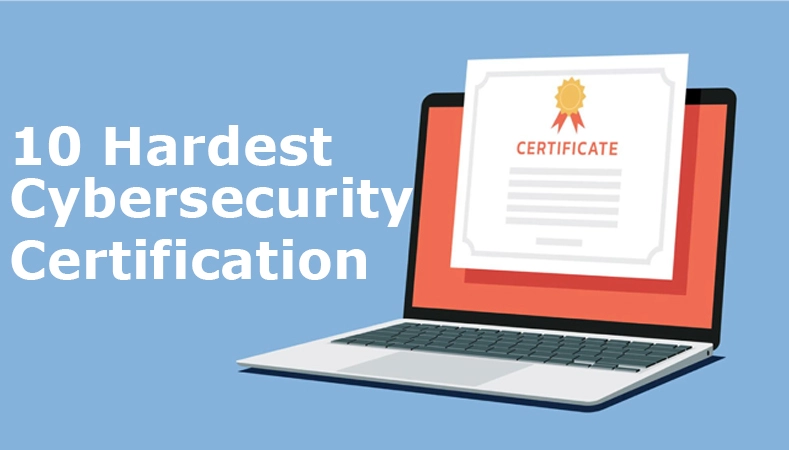Table of Contents
In the rapidly evolving field of cybersecurity, staying ahead requires continuous learning and skill development. One way professionals demonstrate their expertise is through certifications. However, not all certifications are created equal. This article explores the top hardest cybersecurity certifications of 2024, delving into what makes them complex and their relevance in the industry.
What makes a cybersecurity certification “hard”?
Defining the difficulty of a cybersecurity certification involves various factors:
- The depth and breadth of knowledge required play a crucial role. Certifications demanding a comprehensive understanding of diverse topics tend to be more challenging.
- The hands-on skills component adds another layer of complexity. Certifications that assess practical application alongside theoretical knowledge are often considered more challenging.
- The exam difficulty level and the amount of experience and prerequisites needed contribute to the overall complexity of obtaining a certification.
Exam difficulty level?
The difficulty level of cybersecurity exams varies significantly. Some certifications, like the Certified Information Systems Security Professional (CISSP Dumps), have notoriously challenging exams with complex scenarios and multifaceted questions. The difficulty is often reflected in the pass rates, where lower percentages indicate a more rigorous assessment.
Are prerequisites and experience required?
Most challenging certifications demand a certain level of expertise and experience. For example, the Offensive Security Certified Expert (OSCE) requires a prior Offensive Security Certified Professional (OSCP) certification and practical knowledge in the field. The accumulation of hands-on experience and specific prerequisites creates a barrier to entry, making the certification more challenging.
Depth and breadth of knowledge tested?
The depth and breadth of knowledge assessed in cybersecurity certifications are critical determinants of their difficulty. Certifications like the Certified Information Systems Auditor (CISA) cover a broad spectrum of topics, including information systems auditing, control, and security, demanding a comprehensive understanding of various domains within cybersecurity.
Hands-on skills required?
The hands-on skills component is a distinguishing factor in the difficulty of cybersecurity certifications. Certifications such as the Certified Ethical Hacker (CEH) and Offensive Security Certified Professional (OSCP) require practical application of skills in real-world scenarios, making them more challenging as candidates must demonstrate their ability to handle diverse cybersecurity challenges.

What are the top 10 Hardest cybersecurity certifications in 2024?
Craving the ultimate cybersecurity challenge? Look no further than the hardest cybersecurity certifications of 2024! This select group, from the legendary CISSP to the hands-on intensity of the OSCP, tests your knowledge and skills to the limit. Master cloud security with the CCSP, conquer incident handling with the GCIH, or dive deep into AWS with the AWS Certified Security – Specialty. No matter your path, prepare for in-depth exams, years of experience requirements, and specialized expertise. Ready to unlock prestigious careers and stand out in the ever-evolving cybersecurity landscape? Conquer the hardest cybersecurity certifications and prove your mastery!
| Rank | Certification | Focus Area | Difficulty | Experience Required | Exam Highlights |
|---|---|---|---|---|---|
| 5 years of security experience | CISSP | Broad cybersecurity knowledge | Very high | 5 years security experience | Covers 8 domains, emphasizes management |
| 2 | CCSP | Cloud security | High | 5 years IT security, 1 year cloud security | Vendor-neutral, broad cloud security topics |
| 3 | GCIH | Incident handling | High | 2 years information security | Hands-on exercises, incident lifecycle focus |
| 4 | OSCP | Penetration testing | Very high | Experienced penetration testers | Practical exam in real-world environment |
| 5 | CISA | Information systems auditing | High | 5 years IT audit experience | Vendor-neutral, IT governance & control processes |
| 6 | CEH | Ethical hacking | High | Beginner-friendly, focuses on hacking tools & techniques | Broad ethical hacking knowledge, less hands-on |
| 7 | GSEC | Cybersecurity fundamentals | High | Good entry point for other certifications | Covers all 8 CISSP domains in depth |
| 8 | SSCP | Information security administration | High | Foundational knowledge for security admins | Vendor-neutral, covers core security tasks |
| 9 | CASP+ | Advanced cybersecurity | High | Advanced security knowledge & skills | Focuses on enterprise security architecture & incident response |
| 10 | Google Cloud Certified Professional Cloud Security Architect | Google Cloud security | High | 3+ years cloud security & architecture experience | Secure infrastructure, workload & data security, GCP IAM |
Rank them based on your chosen “hardness” criteria.
Ranking the certifications involves weighing the difficulty factors discussed earlier. Considering the complexity of exams, prerequisites, and knowledge depth, the OSCE, CISSP, and CISM often top the list as the most challenging cybersecurity certifications.
Deep dive into 3-5 of the most challenging certifications:
Among the most challenging certifications, the CISSP stands out due to its comprehensive coverage of cybersecurity domains, including security and risk management, asset security, and communication and network security. The OSCE, focusing on advanced penetration testing, requires candidates to exploit systems and identify vulnerabilities in a real-world environment. Additionally, the CISM strongly emphasizes information security management, demanding expertise in governance and risk management.
Explain the specific difficulty factors for each chosen certification.
For the CISSP, the difficulty lies in the extensive breadth of topics covered, including legal and regulatory issues, cryptography, and security architecture. The OSCE’s difficulty is attributed to its hands-on approach, requiring candidates to demonstrate advanced penetration testing skills. The CISM’s challenge lies in its focus on information security management and governance, demanding a deep understanding of risk management and program development.
Highlight unique aspects of the exam process.
The exam processes for these certifications are unique in their own right. CISSP’s adaptive testing format challenges candidates with questions that adjust based on their previous responses, ensuring a comprehensive evaluation. OSCE’s practical exam requires candidates to exploit systems and submit a detailed report of their findings, emphasizing real-world application. CISM’s exam, on the other hand, focuses on information security management and governance scenarios, testing candidates’ ability to navigate complex managerial challenges.
Share insights from successful certificate holders (optional).
Gaining insights from professionals who have successfully obtained these certifications provides valuable perspectives. CISSP holders often highlight the broad knowledge they gained and its applicability across various cybersecurity roles. OSCE achievers emphasize the hands-on experience gained through realistic penetration testing scenarios. CISM certificate holders express the value of mastering information security management and governance, facilitating strategic decision-making in their organizations.
Are these “hardest” certifications also the “most valuable”?
While these certifications are challenging, their value depends on individual career goals. The CISSP is widely recognized and valued for its broad coverage, making it a sought-after certification for cybersecurity professionals. The OSCE is highly valuable for those pursuing roles in advanced penetration testing, showcasing practical skills. The CISM, focusing on information security management, is particularly valuable for professionals aiming for managerial positions in cybersecurity.
Analyze salary potential and job market demand for each certification.
Certifications with higher difficulty often correlate with increased salary potential. CISSP holders, given their comprehensive knowledge, usually command higher salaries in roles such as security consultant or security manager. The specialized skills OSCE-certified professionals demonstrate in penetration testing can lead to lucrative opportunities. With their expertise in information security management, CISM holders are in high demand for roles such as information security manager or IT auditor.

Consider career paths specific certifications unlock.
The career paths unlocked by these certifications are diverse. CISSP holders find opportunities in roles such as security consultant, security analyst, or even Chief Information Security Officer (CISO). OSCE-certified professionals often pursue roles as penetration testers, ethical hackers, or security consultants. CISM opens doors to managerial positions, including information security manager, IT auditor, or risk manager.
Are you ready for the challenge?
Assessing your readiness involves comprehensively evaluating your skills, experience, and career goals. Consider your current knowledge in cybersecurity, hands-on experience, and familiarity with the domains covered by the certifications. Evaluate whether you meet the prerequisites and are prepared for the commitment required to tackle the challenges posed by these certifications.
Assess your current skillset and experience.
Before embarking on the journey towards the hardest cybersecurity certifications, assess your existing skillset and experience. Identify areas where you excel and those that require improvement. Consider gaining practical experience through real-world projects or simulations to strengthen your hands-on skills, a crucial aspect of many challenging certifications.
Recommend study resources and preparation tips for each certification.
Adequate preparation is key to conquering challenging certifications. For CISSP, utilize official study guides, practice exams, and online forums for discussion. OSCE candidates should focus on practical labs, real-world scenarios, and advanced penetration testing training. CISM aspirants benefit from ISACA’s official resources, exam prep courses, and practical experience in information security management.
Discuss alternative or stepping-stone certifications.
For those who still need to get ready for the most challenging certifications, considering alternative or stepping-stone certifications is a prudent approach. CompTIA Security+ is an excellent foundation for those entering the cybersecurity field, covering fundamental concepts. Certified Information Systems Security Professional (CISSP) often paves the way for more advanced certifications, providing a solid knowledge base.
Beyond the “hardest” – Certifications for diverse career paths:
While the focus here has been on the most challenging certifications, diverse career paths in cybersecurity are available. Certifications like Certified Ethical Hacker (CEH), Certified Cloud Security Professional (CCSP), and Certified Information Security Manager (CISM) cater to specific areas within cybersecurity, allowing professionals to specialize based on their interests and career goals.
Emphasize personalized career goals and skill development over “difficulty.”
Choosing certifications should align with personal career goals and interests rather than solely focusing on their difficulty level. Consider the skills you want to develop, the roles you aspire to, and the industry trends shaping the cybersecurity landscape. Tailoring your certification path to your goals ensures a more fulfilling and impactful career journey.
The changing landscape of cybersecurity certifications:
Cybersecurity is dynamic, with certifications evolving to address emerging challenges. Stay informed about the latest trends and new certifications on the horizon. Continuous learning and upskilling are crucial to staying relevant in an industry that constantly adapts to new threats and technologies.
Discuss emerging trends and new certifications on the horizon.
Emerging trends in cybersecurity, such as the increasing prevalence of AI and machine learning, have led to the development of certifications like Certified Information Security Manager (CISM), focusing on managing and mitigating these evolving risks. Keep an eye on upcoming certifications that align with industry shifts and your career goals.
Explore the impact of continuous learning and upskilling.
Continuous learning is fundamental in cybersecurity. Regularly updating your skills through additional certifications and workshops and staying abreast of industry developments enhances your effectiveness as a cybersecurity professional. Upskilling ensures you remain competitive and adaptable in a field where technology and threats evolve rapidly.
Mythbusting: “Hardest” doesn’t always mean “best”:
Dispelling the myth that the hardest certifications are inherently the best is essential. The value of a certification lies in its alignment with your career goals and the skills it imparts. While challenging certifications showcase dedication, it’s crucial to prioritize those that contribute directly to your professional growth and objectives.
Encourage readers to focus on certifications relevant to their career goals.
Instead of pursuing certifications solely based on their difficulty, focus on those directly relevant to your career goals. Tailor your certification path to align with the specific skills and knowledge required for the roles you aspire to. This targeted approach ensures that your efforts contribute meaningfully to your professional development.
Highlight the importance of skills and experience alongside certifications.
Certifications, while valuable, complement a broader skill set and practical experience. Employers often seek professionals with certifications, hands-on skills, and real-world experience. Strive for a balance that positions you as a well-rounded cybersecurity professional.
Community Q&A: Ask the experts about the hardest certifications:
Gaining insights from cybersecurity professionals who have firsthand experience with the hardest certifications adds a valuable dimension to your understanding. In a community Q&A, experts can share their challenges, strategies, and tips for success, providing aspiring candidates with practical advice and motivation.
Feature responses from cybersecurity professionals with relevant experience.
Experts who have successfully navigated the challenges of obtaining the hardest certifications can provide invaluable insights. Their responses can shed light on effective study methods, overcoming obstacles, and the impact of certifications on their careers. Real-world experiences shared by professionals add authenticity and encouragement to the journey.
Address common concerns and provide tailored advice.
Common concerns such as exam anxiety, time management, and balancing work commitments with study can be addressed with tailored advice. Offering strategies to cope with stress, create effective study schedules, and leverage practical experience can empower aspiring candidates to approach the certification journey confidently.
The journey beyond certifications: A holistic approach to cybersecurity success:
While certifications are crucial to a cybersecurity professional’s journey, success extends beyond obtaining certificates. Emphasize the importance of ongoing learning, networking, and gaining real-world experience. A holistic approach ensures sustained growth and resilience in the dynamic field of cybersecurity.
Emphasize ongoing learning, networking, and real-world experience.
Beyond certifications, continual learning and staying informed about industry trends are pivotal. Networking with peers, attending conferences, and engaging in real-world projects contribute to a well-rounded skill set. Combining certifications with ongoing learning and networking enhances your professional standing and opens diverse opportunities.
Share inspiring stories of cybersecurity professionals without formal certifications.
Highlighting stories of successful cybersecurity professionals who have thrived without formal certifications adds nuance to the narrative. Some professionals build their expertise through practical experience, self-study, and continuous learning, showcasing that success in cybersecurity is achievable through various paths.
In conclusion, consider your strengths, career goals, and the industry’s evolving landscape as you embark on your cybersecurity certification path. Remember, a cybersecurity certification roadmap is a guide, not a rigid formula. Tailor your journey based on relevance to your aspirations and the dynamic needs of the cybersecurity field. For more insights and resources, join the growing community at Jointhegrave.com.













Leave a Reply